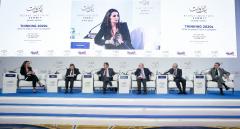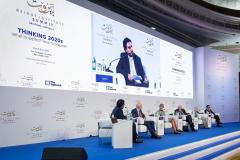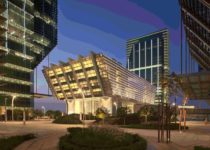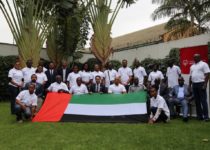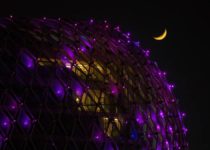Experts convened in Abu Dhabi on the second day of the Beirut Institute Summit Edition III to discuss a number of geopolitical issues in the region.
During the session The Innovation We Expect and How to Harness Data Responsibly, Samer Abu-Ltaif, President of Microsoft Middle East & Africa, spoke of the future in terms of seeing AI and machine learning, not acquired by us, but the way people are using everything today will be infused with AI in every application, domain and tool. “And the purpose of that is to complement what you do on these tools and applications, to let go of all these mundane things and focus as a human being on the insights and ingenuity you could bring,” he said. “And you can imagine the elevations of us as humans if we have that complementary aspect through AI.”
He said skilling and upskilling will be the most critical mandate that governments, educators and enterprises will have, calling for a need to revamp the curriculum. “Everyone needs to get trained,” he added.
Today, the data generated in two days is as much as the data collected in human history before 2003. “There is no doubt that big data is the next frontier for innovation, productivity and competition,” noted Malak Akiely, CEO of Golden Wheat Grain Trading Co. “In the region, we are trying to remove the inefficiencies.”
It was followed by a session on The Economics of Geopolitics in the Middle East, when H.E. Nabil Fahmy, Former Minister of Foreign Affairs of Egypt, Founding Dean of the School of Global Affairs and Public Policy at the American University in Cairo, said that the region is still going on its ignition and therefore the economy is still unstable. He added that the best investment in the economy is to “invest in youth, technology and education.”
Meanwhile, Ambassador Robert Ford, Professor at Yale University, said that to make sure that people of the region are more collaborative with foreign investors, investors must have transparency about the contracts the foreign companies have in these countries. Companies must also show that their contracts are delivering new services or new products, and provide world- class training. “The foreign companies need to show these advantages, that’s how you can convince younger people that globalization is not all bad,” he added.
In the A Conversation With Wisdom discussion, H.E. Abdullah Bishara, Former Secretary-General of the Gulf Cooperation Council said he believes in the courage of the Arab youth. “We need to reinforce this, even among our employees in the GCC, we should work to reinforce courage and to combat hesitation, timidity and fear of taking an initiative because we can touch this fear of initiating matters,” he explained. “Your generation will be able to avoid this timidity and will be able to treat, through technology and other means, this Palestinian cause, because you are the ones who are more equipped and well skilled. The Arab world tried to treat the Palestinian cause in the past by traditional old means that weren’t up to the challenges of this cause.”
H.E. Nabil Elaraby, Former Secretary-General of the Arab League, gave his advice that the new generation should get better education and should know its past and history but should be empowered through education, modern education based on modern technology. “Getting skilled and equipped and having ability to master new technologies is the way forward for the new generation, it’s the orientation and recipe for success of the new generation,” he added.
H.E. Amr Moussa, Former Secretary-General of Arab League, gave three important points, namely that the new generation of immigrants from the Arab world that decided to live abroad in their age have to live in their 21st century, not in the 20th century. They need to live in the age of technology with advancements and enjoy that life. “If we talk about youth specifically, they shouldn’t forget their heritage and roots, but at the same time live proudly where you are in that age,” he noted. “Don’t believe in anything else than success, you must succeed there is no other option. The greatest challenge is the need to succeed and you must re-invest in your home country.”
In a session under the title I’m so Excited and Here’s Why: Testimonials by the Youth, around seven youth representing different spectrums of the work expressed their optimism of the Arab world in the 2020s. “I am looking forward for a new approach to conflict resolution. Young people are finally rejecting the notion that we have to continue the wars that had already started,” said Emtithal Mahmoud, Sudanese-American “Slam” poet and UN Refugee Agency (UNHCR) Goodwill Ambassador.
Chaker Khazaal, Best-selling Author and Journalist from Palestine, said: “I look forward to planting a tree in Jerusalem to remember my grandfather who lived in displacement who he hoped that one day he will return.”
He added: “I look forward to people swimming in the Mediterranean and other seas not to flee instability.”
Donna Maria Feghaly, Art Curator / Architectural Design Retrieving Beirut said that she looks forward that “designers and artists will keep our humanity together.”
Meanwhile, Wafa Ben Hassine, Policy Counsel at Access Now said she looks forward to a freer exchange of ideas without any restrictions. “Instead of talking about liberty, let’s act liberty,” she added.
It was followed by a session on Dealing with Conflicts: the Importance of the Human Infrastructure, when Peter Maurer, President International Committee of the Red Cross, said the region is confronted with a stark choice for the next 10 or 20 years to grab international and national aid and to put band aids on problems, or to build a series of infrastructure which will only be possible if there is a politically different dynamic in the region, which will attract investment in people. “In the first option, the money will run out in a short time,” he added.
Ambassador Ramzy Ezzeldin Ramzy, Egyptian diplomat, Former Assistant Secretary General of the UN and Deputy Special Envoy for Syria, explained that the human infrastructure includes three aspects: education, health and food. “Unfortunately, with the exception of food, the education and health in most of Arab countries, and especially in conflict and warzones, are neglected or not enough attention is dedicated to those infrastructures and might not be there in the foreseen future,” he noted.
Ambassador Robert Ford, Professor at Yale University, highlighted that the conflict in Syria has been so violent and so harsh, and the scale of the humanitarian catastrophe so large, that the international community has been responding mostly on an emergency basis. One half of Syria’s population has had to leave their homes and six million Syrians have had to leave Syria. “The scale is unprecedented since World War 2 and so under those circumstances, the international community’s response has been, above all, just to provide shelter, food and medicine for this vast number of people,” he noted. “If you had the six million Syrian refugees outside the country and then approximately another six million internally displaced, that figure of 12 million is so big that there has been little time and few resources to plan for the kinds of deeper projects to rebuild the human infrastructure in terms of education and stabilization leading to reconstruction. The problem has been too big.”
On the technology level, PwC gave a presentation under the title Fit for the future: Creating a digitally advanced Citizen centric Society on the creation of a digitally advanced citizen-centric society change breeds innovation. In his presentation, Hani Ashkar, PwC Middle East Senior Partner, said that 91 percent of Middle East CEOs believe AI will change how they conduct business; however, 54 percent of CEOs say the lack of digital culture and training is the biggest challenge facing Middle Eastern companies. He stressed the importance of creating a strategy around digital upscaling. “We will miss out if we don’t upscale in our region,” he said.
Rob McCargow, Director of Artificial Intelligence, PwC, said that to create a digitally advanced society, we must firstly reach new channels in this area – a priority to enable the digital economy. Secondly, he called on preparing for this new world, digital and diverse talent; and collaborating to drive targets and the implementation of upskilling initiatives to cultivate change in the society. The presenters stressed the significance of educating and upscaling the workforce to reach a digital economy.
In The Look of the Next Decade: Transitioning to a Circular Economy and Positioning the Arab Region in the Global Industry of Fashion, Design, and Architecture session, Nada Debs, Founder and Creative Director East & East, highlighted that the craft of our region, which is a big part of our identity, should not be neglected. Her mission became to celebrate eastern craftmanship through contemporary design. “We, as Arabs, still do not believe there is a viable craft industry like we had many years ago,” she explained. “Craft is human energy, requiring skills made by the human hand, it requires attention and passion, it’s a spiritual and peaceful act. We are not giving value to the skill, we treat it like a trend, something easily disposable. We should consider this labor of love as precious, and something to pass on to the next generation.”
With over 400 million people in the Middle East that can be catered to, Arab craft has the potential to cross borders so “let’s invest in our craft and people and carve the way for future generations.”
On her part, Celine Semaan, CEO of Slow Factory, noted that technology exists out there, yet what is missing is how to infiltrate it into culture and making everybody want to buy something that is made out of recycled material. “We have done tremendous research on how to introduce innovations into culture and the one thing we found is if it is not embraced culturally, it is not going to work,” she said. “Technology alone will not bring innovation to where we need to see it, especially in the Middle East. Through culture, we can really innovate and bring recognition, awareness and a cultural shift in embracing new technologies and trying new things that are going to benefit both the planet and the people.”
In the session asking Will Europe Wither or Will it Weather the Gathering Storms?, panelists spoke about the ongoing issues within the European Union (EU) as the UK is gearing to leave the EU. They spoke about how an EU without the UK will weaken both parties. The Rt Hon Alistair Burt, Former Minister of State for the Middle East at the Foreign and Commonwealth Office, said that the effect of the ongoing events has weakened the UK. Nonetheless, a UK without an EU will weaken the diplomatic reach of the UK.
H.E. Philip Gordon, Former White House Coordinator for the Middle East, said that traditionally the US “has seen Europe as a key partner in our world affairs. You look around the world and we have expected Europeans as our main partner. It is a simple reality if Europe is going to be massively occupied with these internal challenges then it won’t be our partner. If it is going to just be tearing itself internally, then one can wonder about what this transatlantic relationship will look like.”
H.E. Dr. Danilo Turk, Former President of Slovenia, suggested to look at three main points, including a fresh look at the good definition of solidarity within the EU, solidarity meaning cohesions, migrations and “we are part of the problem for leading the UK to the referendum to leave the EU”. Secondly, he spoke of a need for the EU to figure out how to conduct its common and foreign policy. Thirdly, he said the EU must look for partners to deal with on subjects such as climate change.
During The Security Discourse: Towards a Decade of Peace or a Decade of Wars session, Dr. Irina Zvyagelskaya, Head of the Center Institute of World Economy and International Relations, spoke of a fragmentation of actors within the context of various conflicts and it means it is more and more difficult to deal with them. “Sometimes, small threats are much more important than big ones, so I believe it is not only Russia, the US or Europe, but rather the role of local powers is becoming much more important,” she noted. “All of us cannot solve anything in the Middle East without the participation of the local States and we should rely on them much more than we did before.”
Michael Singh, Managing Director of The Washington Institute for Near East Policy, explained that we have had 40 years of conflict with Iran so assuming it will continue with or without the JCPOA is a safe bet. He anticipates we will have that conflict and we will need to determine how we can use diplomacy to mitigate that conflict where we can and to contain and deter Iran where it is necessary to do so. On European engagement in the Middle East, he said what the US leadership and engagement in the region has done in the past is providing a sort of platform for engagement of partners around the world. “And sometimes, those countries have engaged by opposing US policy, sometimes by joining in and supporting it,” he said. “And one of the challenges that US disengagement from the region poses is that these other partners around the world are left without an American initiative to respond to. It has made them uncertain about their own engagement in the region.”
In the session on American-Russian Relations: Clash of Collaboration in the Middle East?, Ambassador Robert Blackwill, Henry A. Kissinger Senior Fellow, Council on Foreign Relations, said that the American Russian relationship is at its worst since the end of the Soviet Union. He added that “the US Russian relationship, if it’s going to improve, has to improve in Europe not in the Middle East.”
Andrey Bystritsky, Chairman of the Board of the Valdai Discussion Club, said that to solve the Middle East conflict, there should perhaps be a collaboration between Russia and China. “Russia and China are very careful because the situation is very complicated and it’s not very easy to find a solution,” he added.
In response, H.E. Andrei Fedorov, Chairman of the Fund for Political Research and Consulting, said, however, that China tries to maintain its distance from the Syrian conflict.

